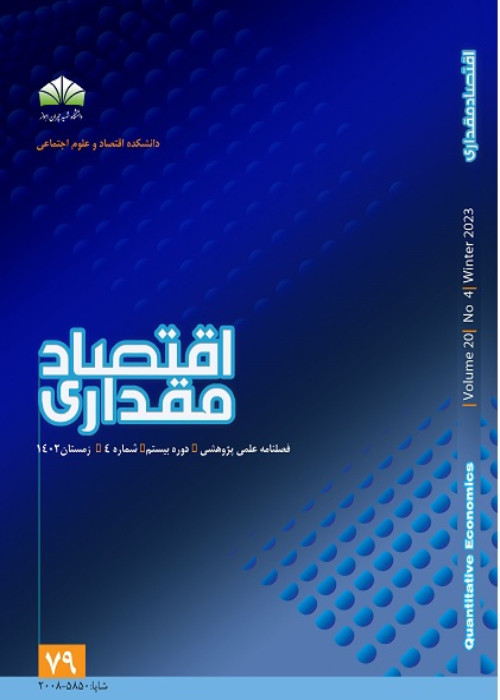Monetary Policy and Commodity Terms of Trade Shocks
The commodity terms of trade shocks are important to explain the macroeconomic fluctuations of oil-exporting countries. Oil price shocks are the main source of terms of trade variability in oil-exporting countries. Given the significant effects of terms of trade fluctuations on domestic macroeconomic variables, understanding the transmission and propagation of terms of trade fluctuations is crucial in the design and conduct of macroeconomic policies in oil-exporting countries. An appropriate monetary policy can help to stabilize these shocks.This study evaluates three alternative monetary policy regimes’ responses to commodity terms of trade shock and export sector productivity shock using a New Keynesian Dynamic Stochastic General Equilibrium (DSGE) model. In this study, the model has been developed based on Hove et al. (2015), Monacelli (2005) and Cashin et al. (2004) for the economy of Iran. This theoretical framework characterizes a small open oil-exporting economy by two domestic sectors: traded sector and the non-traded sector. In the non-traded sector, prices are sticky according to Calvo`s (1983). There is one external sector which is the rest of the world. Also, incomplete exchange rate pass-through is introduced via nominal rigidities on import prices. This model has been developed to evaluate the response of different monetary policy regimes to commodity terms of trade shocks and export productivity shocks. Based on empirical evidence such as Shajari et al (2015), pass-through is assumed to be incomplete in the model.Since oil exports account for a high percentage of export earnings and finance a significant portion of government spending in Iran, the analysis of different monetary policy responses to commodity terms of trade shocks in an oil-exporting country, like Iran, must be important. This study aims at investigating the dynamic effects of commodity terms of trade shocks and evaluating the performance and the stabilization properties of various simple monetary policy rules for oil-dependent economies. Three alternative monetary policy rules have been considered: CPI inflation targeting (CIT) rule, non-traded inflation targeting (NTIT) rule, and exchange rate targeting (ET) rule. Different monetary policy rules are assessed based on the degree to which they minimize the volatility of selected macroeconomic variables as reflected by their impulse response functions.
The model is calibrated to match the key features of the Iran economy using data for the period 1991: Q1 to 2017: Q1. The series of Oil production and Non-oil production is obtained from the “Statistical Centre of Iran” The series of Interest rate and oil prices are obtained from the “Central Bank of Iran”. The series of production in the oreign intermediate sector and foreign intermediate good price are obtained from the “Archival Federal Reserve Economic Data”[1]. Other parameters were obtained from previous studies on the Iran economy and business cycle literature in the world. The model is calibrated to the Iran economy. The model is solved numerically and the parameter choices for the model are summarized in Table1.
The comparison of responses under different monetary policy regimes shows that CPI inflation targeting is superior to the NTIT and ET targeting when commodity terms of trade shock happen. For export productivity shock, the performance of the CIT rule is better than other examining monetary policy rules. Also, the real exchange rate, which is defined as a function of commodity terms of trade and productivity differentials, makes it possible to examine the role of export productivity shock on macroeconomic variations and test the existence of Balassa- Samuelson effect. Impulse responses to commodity terms of trade shock show increasing in total output and CPI inflation and decreasing in consumption and nominal exchange rate under three policy rules. The analysis also displays that commodity terms of trade shock induce lower responses of macroeconomic variables under CPI inflation targeting than under non-traded inflation targeting and exchange rate targeting. Under the export sector productivity shock, exported output increases while non-traded output decreases, possibly reflecting the symptoms of the Dutch disease. On the other hand, the dynamic responses of selected macroeconomic variables suggest the presence of the Balassa-Samuelson effect where an increase in productivity in the traded sector appreciates the real exchange rate and increases the prices of non-tradable goods through wage equalizations.
overall, when the economy is experiencing commodity terms of trade shocks or exported productivity shocks, CPI inflation targeting is relatively better than exchange rate targeting and non-traded inflation targeting in macroeconomic stabilization.
- حق عضویت دریافتی صرف حمایت از نشریات عضو و نگهداری، تکمیل و توسعه مگیران میشود.
- پرداخت حق اشتراک و دانلود مقالات اجازه بازنشر آن در سایر رسانههای چاپی و دیجیتال را به کاربر نمیدهد.


